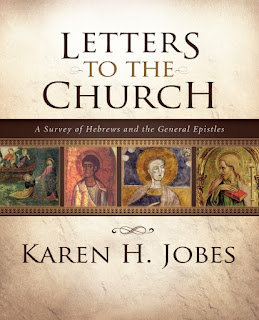I've spent the past few days immersed in Karen Jobes' chapters on the book of James in Letters to the Church: A Survey of Hebrews and the General Epistles. I think of Dr. Jobes like I think of a forest ranger in a National Park. While I can appreciate the park's beauty on my own, a few moments with the ranger opens up new worlds of understanding, showing me what I would otherwise miss and helping me understand the mysteries of nature. Dr. Jobes does that for these New Testament books. Having spent half a lifetime immersed in these texts, she is a proficient guide who can help me get the most out of reading them.
Here are some of my favorite gems on the book of James (emphasis mine):
"Simply put, the purpose of the letter [of James] was to instruct Jewish Christians how to live faithfully to Christ within their heritage as Jews." (166)
"James is presenting the Christian concept of a whole and unified person as the goal of spiritual maturity." (202)
"Every test [or trial in life] occasions a theological crisis, when the believer is more easily deceived or confused about who God is and how God acts." (167)
"Love for God expressed through love for neighbor is the wellspring of the faithful life wisely lived." (205)
"What is distinctive in [Jesus'] message is that he proclaims himself to be the way to life's highest good -- the way to eternal life reconciled with God." (211)
"Whatever a profession of faith in Jesus Christ might mean, it cannot mean a license to live free of God's moral order." (221)
"If believers of means [i.e. wealthy Christians] rely on their resources rather than God, if they expect to be treated with privileged status, if they oppress others to sustain self-interest, then they are 'the rich' who are condemned. . . . James's point is that Christians with resources must live differently than 'the rich' by caring for the poor; otherwise they have not truly understood and believed the gospel." (229)On the perceived conflict between the theology of Paul and James, Dr. Jobes writes:
"Given that James and Paul, as well as Peter, left the Jerusalem Council [see Acts 15] in agreement on the epoch-making decision that Gentiles would be received as Christians without becoming Jewish and keeping the law of Moses, it seems unlikely that they disagreed over the fundamental nature of faith and salvation." (173)
"James was not writing in reference to justification but rather to describe the moral responsibilities that flow from saving faith." (219)The final gem is a quotation from Ellen Charry's By the Renewing of Your Minds, quoted in a sidebar in Letters to the Church. This may be my new all-time favorite quote:
"The central theological task is and has always been pastoral, assisting people to know God, and by knowing him to be enabled to strive toward the excellence of his character in their own lives." (222)


No comments:
Post a Comment